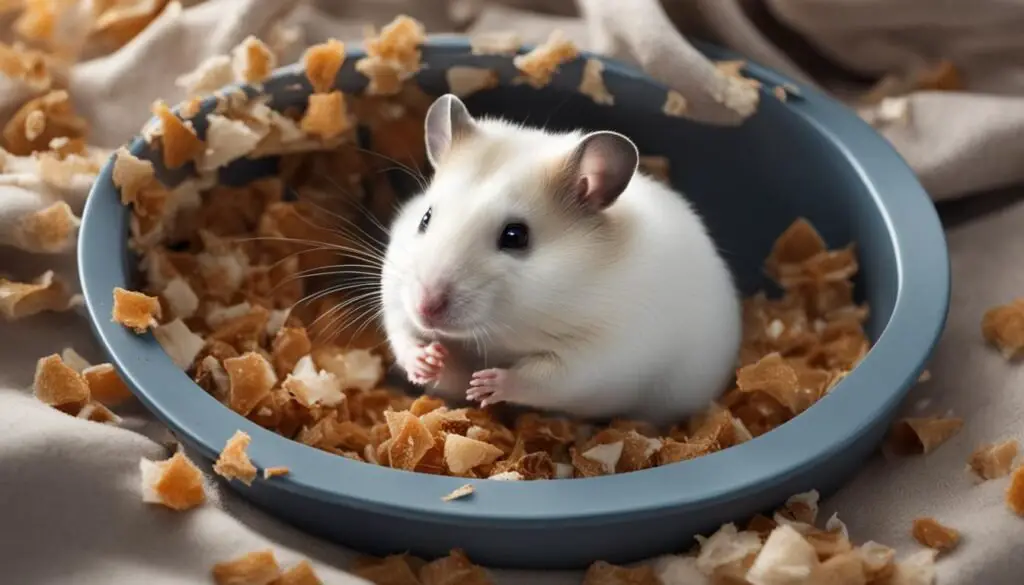Did you know that approximately 70% of hamsters exhibit a peculiar behavior of eating their bedding? If you’ve ever wondered why your hamster is munching on its cozy home, you’re not alone. This seemingly odd behavior can be a cause for concern among pet owners, but it’s essential to understand the reasons behind it.
The Importance of Bedding for Hamsters
When it comes to keeping your furry friend happy and healthy, providing the right bedding is essential. Hamsters have specific needs when it comes to their habitat, and choosing the right bedding plays a crucial role in meeting those needs.
First and foremost, bedding provides comfort for your hamster. Imagine sleeping on a hard surface all the time – not very pleasant, right? Well, the same goes for our tiny friends. The soft and cozy bedding creates a comfortable sleeping space where your hamster can curl up and relax.
But bedding does more than just provide comfort. It also helps with insulation, keeping your hamster warm during colder months. Additionally, bedding absorbs moisture and odors, keeping the habitat clean and fresh.
One of the most important benefits of bedding is that it promotes natural burrowing behavior. Hamsters are instinctive burrowers, and having the right bedding allows them to engage in this natural behavior. It gives them a sense of security and helps them feel at home in their habitat.
Now, not all bedding is created equal. It’s important to choose the right type of bedding that is safe and suitable for hamsters. Avoid using pine or cedar shavings, as they contain harmful oils that can negatively impact your hamster’s respiratory system. Instead, consider options like paper-based bedding, aspen shavings, or hemp bedding. Look for bedding that is absorbent, dust-free, and provides a comfortable and safe environment for your hamster.
In conclusion, bedding plays a crucial role in your hamster’s well-being. It provides comfort, insulation, and promotes natural burrowing behavior. By choosing the right bedding, you can ensure that your hamster is living in a happy and healthy habitat.
The Nutritional Value of Bedding for Hamsters
While bedding is important for a hamster’s habitat, it is not a nutritional food source for them. Hamsters are omnivores and require a balanced diet consisting of high-quality pellets, fresh fruits, and vegetables.
Eating bedding can lead to digestive problems such as gut impaction, constipation, or diarrhea, which can be fatal if not addressed. Therefore, hamsters should not rely on bedding to meet their nutritional needs.
It is crucial for pet owners to provide a proper diet to ensure their hamsters’ health and well-being. By offering a well-balanced hamster diet, you can provide the necessary nutrients to support their growth, energy levels, and overall health.
Incorporate high-quality hamster pellets into their diet as the main source of nutrition. These pellets are specially formulated to meet the nutritional needs of hamsters and provide a balanced combination of proteins, carbohydrates, vitamins, and minerals.
Supplement their diet with fresh fruits and vegetables to provide additional nutrients and natural sources of hydration. Some suitable options include small amounts of apples, carrots, leafy greens, and cucumber. However, it’s important to introduce new foods gradually and monitor how your hamster responds to them.
Remember to provide plenty of fresh water at all times, using a sipper bottle attached to their enclosure. Clean the water bottle regularly to ensure it is free from bacteria and contaminants.
By prioritizing their nutritional needs and providing a diverse and balanced diet, you can help your hamster thrive and maintain optimal health. Remember, bedding is for comfort and habitat, not for nutrition!
The Role of Bedding in Maintaining Hamster’s Dental Health
Like all rodents, hamsters have continuously growing teeth that need constant wear to prevent overgrowth. Chewing on hard objects, including bedding material, helps naturally wear down their teeth. However, excessive chewing on bedding can lead to dental problems and pain. Dental issues can result in loss of appetite, weight loss, and other health problems. Therefore, it is important to monitor your hamster’s chewing behavior and provide appropriate chewing toys to maintain their dental health.
Chewing on bedding not only helps wear down a hamster’s teeth but also promotes healthy jaw muscles and prevents the formation of sharp edges on their teeth. By providing an outlet for their natural chewing behavior, you can contribute to their overall dental well-being.
To keep your hamster’s teeth healthy, offer suitable chew toys made of safe materials such as hardwood, unpainted and untreated wooden blocks, or specially designed hamster chew toys available at pet stores. These toys will satisfy your hamster’s need to chew while sparing their bedding from excessive wear and potential dental problems.
Regularly inspecting your hamster’s teeth is essential. Look out for signs of overgrowth, chipped or broken teeth, or any abnormalities. If you notice any dental issues, consult a veterinarian experienced in hamster care as they may need to trim or treat their teeth.
By providing appropriate chew toys and monitoring your hamster’s dental health, you can help prevent dental problems and ensure a happy and healthy hamster.
Behavioral Reasons for Hamsters Eating Their Bedding
Hamsters are curious and active creatures, and their behavior can sometimes include eating their bedding. This behavior can have various motivations and serve different purposes for hamsters.
Some hamsters may chew and eat their bedding as a form of exploration, using their sense of taste and touch to interact with their environment. It can be a way for them to satisfy their natural foraging instinct and engage in playful behavior. In some cases, eating bedding may also provide a source of relief from boredom.
Eating bedding can also serve as a way for hamsters to mark their territory. Just like other animals, hamsters have a natural instinct to claim their space and create boundaries. By chewing and ingesting bedding material, they leave their scent and mark their territory.
Another reason hamsters may eat their bedding is related to their nesting behavior. Hamsters like to create cozy nests for themselves using materials found in their enclosure, including bedding. By chewing and eating bedding, they can gather the material they need to build and maintain their nests.
While these behaviors can be normal to some extent, excessive or compulsive eating of bedding may indicate underlying health or behavioral issues. It is important to monitor your hamster’s behavior closely to ensure their well-being.
The Effect of Stress on a Hamster’s Eating Habits
Stress can have a significant impact on a hamster’s eating habits, often resulting in stress-related behaviors such as the consumption of bedding. When hamsters experience changes in their environment, loud noises, or a lack of stimulation, they may exhibit behaviors that indicate stress. One such behavior is eating their bedding, which can serve as a coping mechanism to relieve anxiety or combat boredom.
To ensure the well-being of your hamster, it is crucial to provide a calm and secure environment. Creating a stress-free hamster environment involves enriching their habitat with toys and activities that stimulate their senses and alleviate boredom. Consider providing chew toys, tunnels, and wheels to keep your hamster engaged and entertained. Additionally, maintaining a consistent routine and minimizing stressful stimuli in their surroundings can help reduce their overall stress levels.
Oftentimes, stress-related behaviors, such as eating bedding, can be a sign of underlying stressors that need to be addressed. Take note of any changes in your hamster’s behavior and environment that may be contributing to their stress. By identifying and addressing these stressors, you can help prevent the excessive consumption of bedding and promote a healthier and happier hamster.
Health Implications of Eating Bedding for Hamsters
Eating bedding can have serious health implications for hamsters, including digestive problems and intestinal blockages. When hamsters consume large amounts of bedding, it can lead to gut impaction, causing discomfort and potentially obstructing their digestive system. This can result in digestive issues such as constipation or diarrhea, which can be harmful to their overall health and well-being.
Furthermore, the act of eating bedding can also pose dental problems for hamsters. The rough texture of the bedding material can cause excessive wear on their teeth, leading to dental issues, pain, and difficulty in eating. It is essential to ensure that hamsters have access to appropriate chew toys to help them wear down their teeth naturally.
If a hamster ingests a significant amount of bedding, it can also result in intestinal blockages. These blockages can prevent the proper flow of food through the digestive tract, leading to severe discomfort and potentially life-threatening complications. It is important for pet owners to be vigilant and monitor their hamsters closely for any signs of illness or distress related to eating bedding.
If you notice any changes in your hamster’s behavior, such as reduced appetite, abdominal pain, or difficulty in passing stool, it is crucial to seek veterinary attention immediately. A veterinarian will be able to diagnose and treat any underlying digestive problems or blockages effectively.
To prioritize the health and well-being of your hamster, take steps to prevent them from eating their bedding excessively. Ensure that their habitat is enriched with appropriate bedding material, provide plenty of chew toys to satisfy their natural chewing instincts, and regularly clean their enclosure to minimize the risk of ingesting contaminated bedding.

Preventative Measures to Stop Hamsters Eating Their Bedding
Preventing your hamster from chewing on its bedding requires a multi-faceted approach. One important step is to provide sufficient bedding material and chew toys. This helps redirect their chewing behavior towards appropriate objects and reduces the likelihood of them munching on their bedding. Additionally, offering a well-balanced diet and ensuring proper hydration can help prevent nutritional deficiencies that may trigger bedding chewing. So make sure to provide your furry friend with a diet rich in high-quality pellets, fresh fruits, and vegetables.
Reducing stressors in your hamster’s environment is crucial in preventing excessive bedding chewing. Create a secure and enriching habitat for your pet by providing toys, tunnels, and other forms of mental and physical stimulation. This will not only keep your hamster entertained but also help alleviate stress and prevent them from resorting to nibbling on their bedding.
To keep your furry friend happy and healthy, it’s important to implement these preventative measures. By providing ample bedding, engaging hamster enrichment, and maintaining a nutritious diet, you can effectively discourage bedding chewing and ensure the well-being of your hamster.
